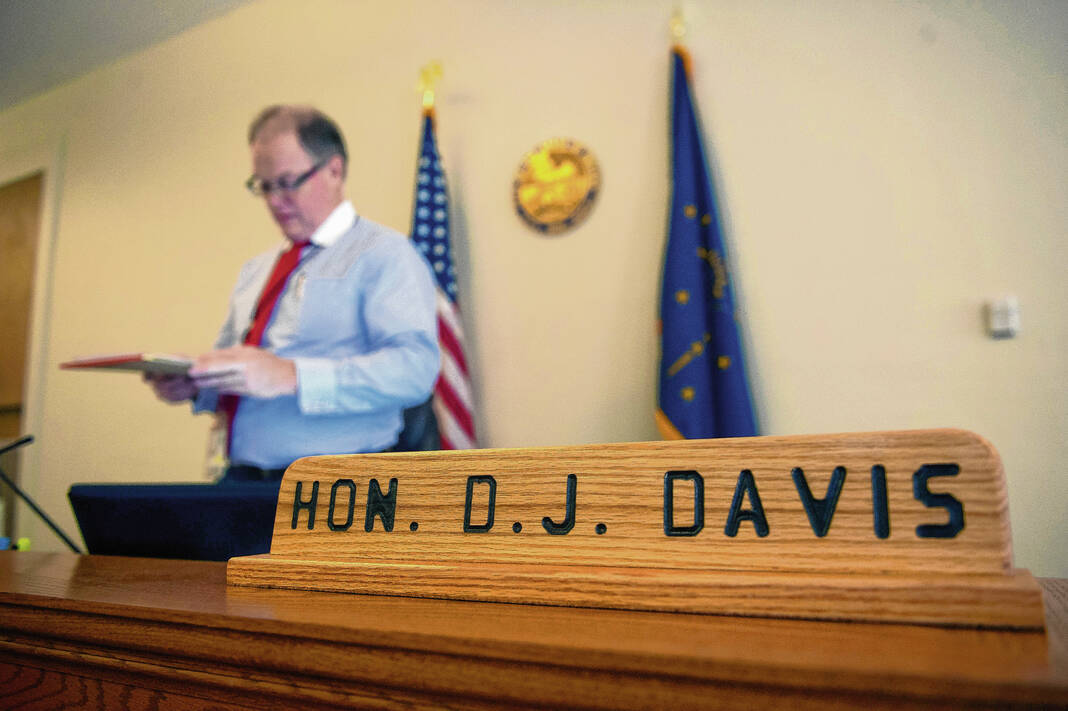HANCOCK COUNTY — It’s been six months and counting since Hancock County Superior Court 1 had its elected county judge, D.J. Davis, sitting on the bench and handling cases on a daily basis.
Just when Davis will return from an extended medical leave, which started in early April, has yet to be made known to local judicial officials or the community.
An order from the Indiana Supreme Court expired Wednesday. That order assigned a temporary judge to the court for 90 days back in July with the thought Davis would be able to return from back surgery in a timely manner. Unfortunately, the judge assigned to fill-in for Davis only lasted a few weeks, leaving other court officials and Davis to try to make sure cases were covered.

When the Daily Reporter reached out to Davis in early October to see if he’d be able to attend a judicial mental health conference in Indianapolis on Oct. 21, a family member informed the paper Davis could not speak via phone due to having suffered a separate medical issue.
The family member instead asked the paper to call back in another 30 days, mid-November, when the family hoped to know more about a possible return.
The Daily Reporter reached out to the Indiana Supreme Court to see if they planned to intervene again now that the 90 temporary replacement order ended and they said no. Officials replied via email that once elected, it is the judge’s constitutional responsibility to ensure the business of the court continues.
“If a judge cannot fulfill their duties, the judge can make a decision to retire due to disability,” Indiana Supreme Court Chief Public Information Officer Kathryn Dolan said in the email.
Dolan noted that the Office of Judicial Administration is prepared to provide support and resources in the event a judge notifies their office that he or she is unable to return to the bench — which they did once before with the previous, now expired order.
During Davis’ absence, Hancock County Superior Court 1 is limping along, which is not a positive situation for county residents, county officials and those associated with work needed to be done in the court. The court had a total of 8,304 cases in 2021, according to Indiana Trial Court statistics, including over 1,700 new cases.
Speaking on behalf of the county’s judiciary, Magistrate Cody Coombs noted that Hancock County has been allotted four judicial officers because that’s how many judicial officers it takes to do the amount of work that comes through Hancock County’s Courthouse. He’s referring to some 26,300 cases total in 2021, including over 6,000 new cases. Since early April, the local courts have been operating with only three full-time judicial officials and a variety of fill-in and senior judges handling duties in Superior Court 1.
“When one judicial officer is not available, there is going to be a natural increase in pressure on the judicial system and the remaining judicial officers as the work that comes through the courthouse has to be done regardless of whether all four judicial officers are actually available,” Coombs said.
Coombs noted the other county judges have limited authority in Superior Court 1, so there’s only so much help he, Judge Scott Sirk and Judge Dan Marshall can provide. As of Sept. 1, Coombs returned to his normal rotating schedule, one that calls for him to hear cases in all three courts, in essence leaving Superior Court 1 up to Davis to cover.
Prosecutor Brent Eaton said the absence of a daily judge in one of the courts is having a direct effect on his office, not to mention the fact the county has not had a full-time judicial officer in charge of the newly created Behavioral Health Court since Davis left the office in April.
“I’ve tried to put as many things on my office’s back as I can, but there are just so many things we can do and that’s a big problem,” Eaton said.
Eaton is frustrated, he said, not knowing which judge his deputy prosecutors or he will be working with on a day-to-day basis. That is a problem Eaton noted as many cases have had multiple judges making decisions rather than just one judicial officer working a case.
“As a prosecutor, people expect results and not excuses,” Eaton said. “People have expectations for the work we do in the justice system to be done at a high level, and we work hard regardless of if we’re fully staffed or don’t have the technology we need, so when other parts of the justice system are not working properly or at full capacity it makes things a lot harder.”
Coombs said, from a judicial standpoint, it is preferential in many cases to have one judge hear all related issues in a case.
“It is not absolutely necessary, though,” Coombs said. “Over time, judicial officers become accustomed to hearing matters in cases that they may not have heard before.”
Coombs went on to say that he does understand how not knowing which judge will hear a case or not knowing anything about the specific judge available to hear a case can contribute to additional stress on litigants.
Davis took medical leave on April 5, letting others know via a post on social media he was dealing with health issues which his family noted had to do with his back.
“Back on April 5, I turned 50 years old and while I joked its all downhill once you turn 50, I had no idea that my 50th Birthday would change my life, unexpectedly, in an instant and rock my world, but not in a good way unfortunately,” the post stated.
Davis has not been back to conduct court business at the courthouse on a full-time basis since. His family told the Daily Reporter in mid-summer that Davis had back surgery, but was doing well and hoped to return soon.
The Daily Reporter was told the new health issue requires specialized hearing equipment for Superior Court 1. The family said they planned to ask county officials for the funding to get the hearing equipment for the courtroom. However, when the Daily Reporter checked with Hancock County council several weeks after talking to the Davis family, the paper was told nothing official has been submitted by Davis for new equipment.
Councilman Jim Shelby said Sirk briefly mentioned to the council several weeks ago there might be a need for funding for Davis’s court, but nothing has been submitted.
“There has been no official request for any funding or details of plans for funding,” Shelby said.
In addition to the work inside the courtroom, Coombs noted county judges do a lot of work behind the scenes when they are not on the bench, such as coordinating with other government agencies, staff management, policy development, community outreach, things the general public may not see.
“Judge Marshall, Judge Sirk and I help with those tasks where we can, but Judge Davis is the only Judge who has the authority to set the policy for Superior Court 1 and that can make behind-the-scenes work, especially ongoing coordination with other government agencies and policy development, difficult,” Coombs said.
The Daily Reporter has reached out numerous times to speak with Davis and each time was told he could not talk. Davis replied to the Daily Reporter’s latest email on Monday afternooon, stating that he had read the questions and would follow up after speaking with some people, but a reply was not recevied as of print deadline.





